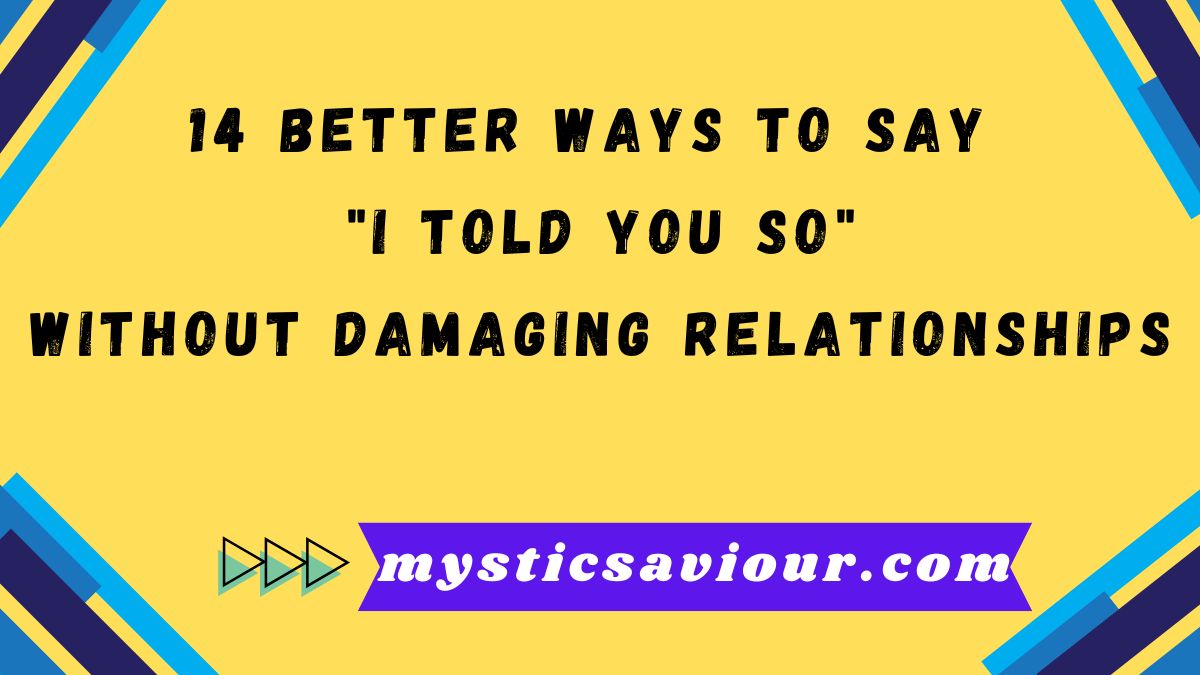“14 Better Ways to Say ‘I Told You So’ Without Damaging Relationships” refers to tactful alternatives that help convey a sense of prior warning or foresight without coming across as arrogant, dismissive, or confrontational. It’s about maintaining empathy and respect while subtly acknowledging that your advice or prediction was accurate. These expressions allow you to preserve trust and harmony, especially in personal or professional relationships, where tone and delivery matter just as much as the message itself.
Sometimes, it’s not what you say, but how you say it. A well-timed, thoughtfully worded response can protect your relationships, even in those “I warned you” moments. These phrases strike a delicate balance between honesty and compassion—letting you express yourself without making the other person feel belittled or judged. It’s communication with emotional intelligence.
Learning better ways to say “I told you so” is more than just wordplay—it’s a skill that helps you lead, support, and connect without creating friction. These 14 alternatives offer powerful tools to keep conversations constructive while still honoring your insights and advice.
Why We Feel the Urge to Say “I Told You So”
Before diving into alternatives, let’s understand why this phrase is so tempting. The desire to say “I told you so” stems from a deeply human need for validation. When we offer advice that’s ignored only to be proven right later, several psychological factors come into play:
- Recognition of our wisdom – We want acknowledgment for our accurate outcome prediction
- Frustration at not being heard – Especially when we invested energy in providing guidance
- Self-protection – Establishing a track record of good judgment for future scenarios
- Desire for respect – Wanting others to value our input moving forward
According to Dr. Mark Goulston, psychiatrist and author of “Just Listen,” “The need to be right often masks a deeper need to be valued. When someone dismisses our advice only to discover we were right, saying ‘I told you so’ is our way of demanding the recognition we felt we deserved earlier.”
“The satisfaction of being right lasts about five minutes. The damage done to relationships when you rub it in can last much longer.” – Anonymous
Understanding these motivations helps us find more productive ways to address the situation without triggering defensiveness. After all, the goal should be better decision-making and stronger relationships, not winning points in some imaginary scorekeeping system.
Gentle Reminder Phrases
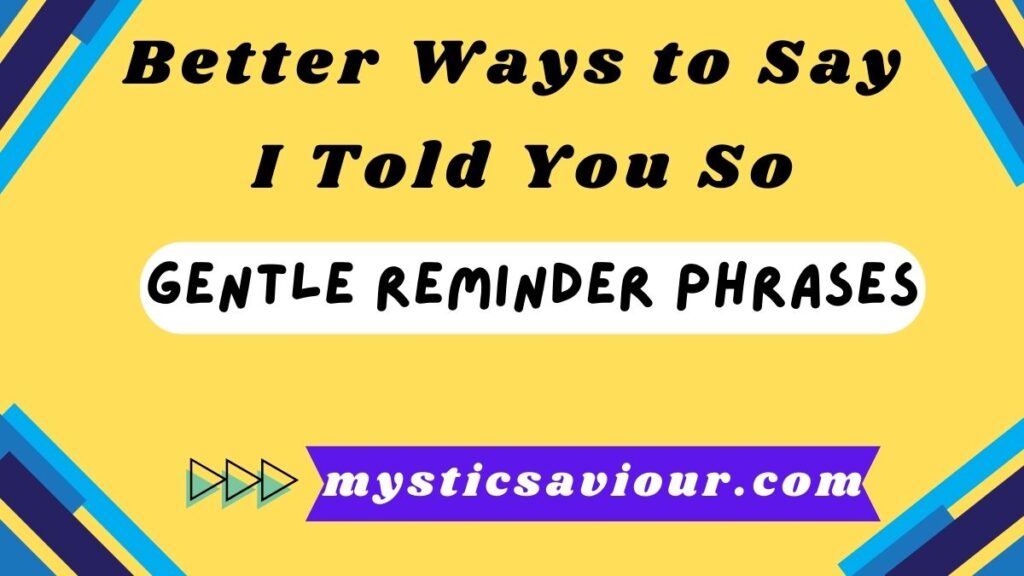
When you need to establish that you did provide warning without sounding accusatory, these polite reminder options work well in most situations:
“As we discussed earlier…”
This phrase acknowledges your previous conversation without directly highlighting that you were right and they were wrong. It’s a gentle nudge that maintains the other person’s dignity while still establishing that you addressed this possibility.
Example: “As we discussed earlier, the timeline for this project was quite ambitious. Now that we’re behind schedule, should we revisit our contingency plan?”
“As I mentioned before…”
Similar to the above, this alternative expression reminds others of your previous input without the triumphant tone of “I told you so.” It works particularly well in professional communication settings where maintaining productive working relationships is essential.
Example: “As I mentioned before, these suppliers sometimes have inventory issues. Let’s contact our backup vendors to avoid production delays.”
“You might recall our conversation about this…”
This phrasing invites the other person to remember your discussion rather than forcing the point. It’s less confrontational and gives them space to acknowledge your previous advice without feeling cornered.
Example: “You might recall our conversation about this property’s flood risk. Since the basement is now underwater, shall we look into those mitigation options we talked about?”
“Remember when we talked about this possibility?”
Framing your “I told you so” as a question feels less accusatory and more collaborative. It gently reminds them of your predictive insight while opening a door to problem-solving rather than blame.
Example: “Remember when we talked about this possibility with the merger? Now that it’s happening, what aspects of our contingency plan should we implement first?”
Empathetic Approaches
Sometimes, the situation calls for more compassion than reminder. These phrases acknowledge your correct prediction while showing genuine concern for the other person’s predicament:
“I understand why you chose that direction, though I was concerned about…”
This balanced statement shows empathy for their decision process while still acknowledging your reservations. It’s perfect for situations where someone took a calculated risk that didn’t pay off.
Example: “I understand why you chose that investment approach, though I was concerned about the market volatility. How are you feeling about it now?”
“I wish things had turned out differently for you”
This expression skips the reminder entirely and focuses purely on empathy. When someone is already suffering from the consequences of not heeding advice, sometimes compassion is more valuable than confirmation of your correctness.
Example: “I wish things had turned out differently for you with that job opportunity. It seemed promising despite the red flags we noticed.”
“That’s frustrating—I’ve been in similar situations”
Sharing your own experience of making mistakes normalizes the human tendency to sometimes make the wrong call. This friendly advice approach builds connection rather than distance.
Example: “That’s frustrating about the contractor abandoning the project. I’ve been in similar situations—it’s why I’m now so careful about checking references thoroughly.”
Forward-Looking Alternatives
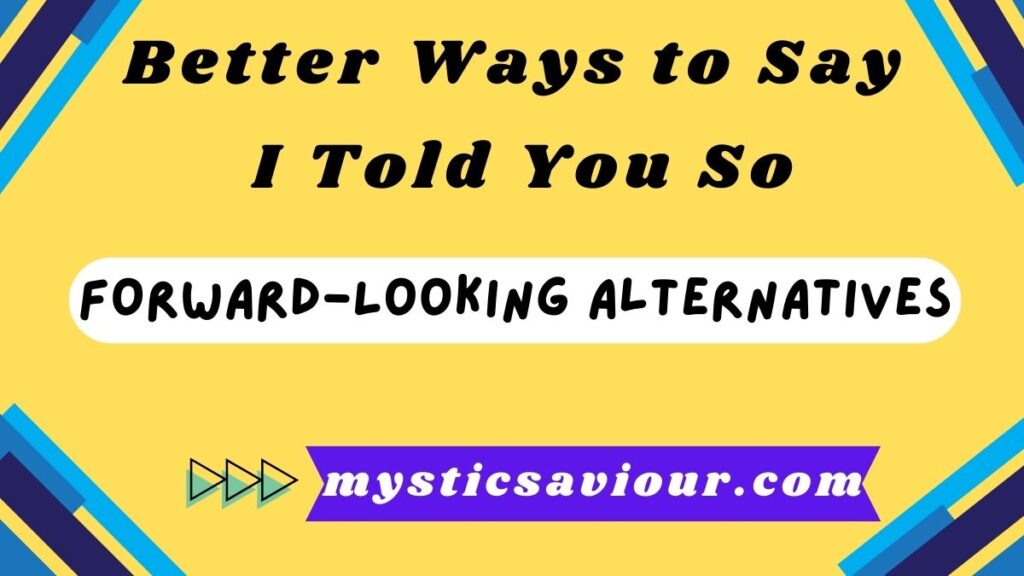
Rather than dwelling on past missteps, these phrases pivot the conversation toward solutions:
“What can we do now to improve the situation?”
This question immediately redirects focus from who was right to what can be done. It’s solution-oriented and promotes collaborative problem-solving rather than blame allocation.
Example: “What can we do now to improve the situation with the delayed product launch? I have some ideas if you’re open to them.“
“Let’s figure out next steps together”
This invitation to collaboration shows you’re invested in resolution rather than just being right. The word “together” is particularly important as it reinforces partnership.
Example: “Let’s figure out next steps together now that the software deployment has hit these bugs. I think we can still salvage the timeline.”
“I’m happy to help you work through this”
Offering assistance demonstrates that your primary concern is the person and the problem—not claiming credit for your predictive insight. This approach builds trust rather than resentment.
Example: “I’m happy to help you work through this supplier issue. Since we’ve discussed the reliability concerns before, I’ve already researched some alternatives we could consider.”
Humor-Based Options
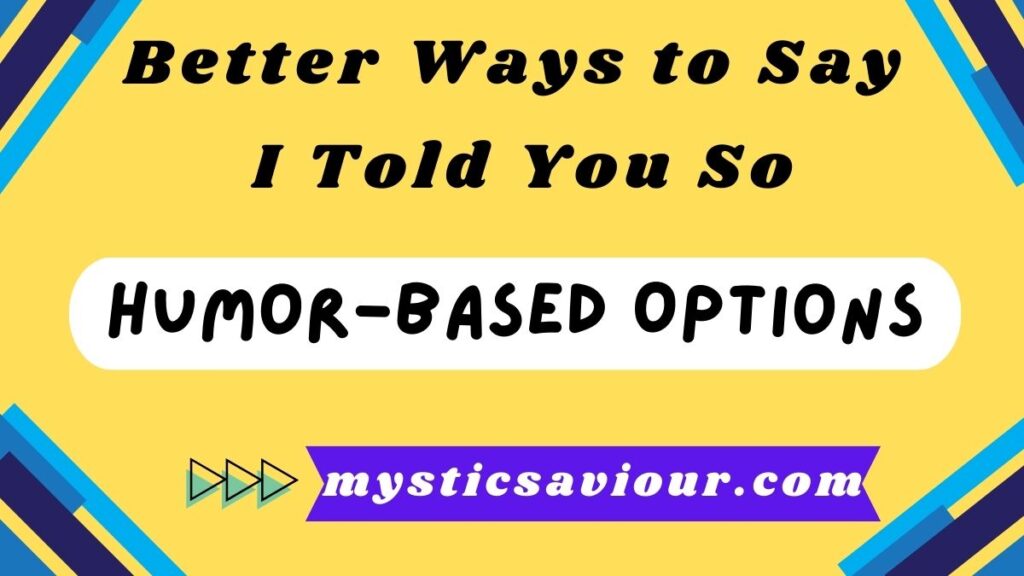
When you have a solid relationship with someone, humor can defuse tension while still acknowledging your accurate prediction:
“My crystal ball was working that day!”
A lighthearted joke about your predictive powers is often better received than a direct “I told you so.” This light-hearted reminder acknowledges your accuracy without making the other person feel diminished.
Example: “My crystal ball was working that day when I suggested backing up those files! Good thing we have that second copy now.”
“Guess my fortune-telling skills aren’t so bad after all”
Self-deprecating humor about your predictive abilities can acknowledge your accuracy while keeping the tone friendly rather than smug.
Example: “Guess my fortune-telling skills aren’t so bad after all! Though I’d much rather have been wrong about those budget cuts.”
Professional Settings
In workplace environments, more formal acknowledgments of previous warnings may be necessary, particularly for documentation or planning purposes:
“The data supported that outcome, which is why I suggested…”
Referencing objective information rather than personal opinion makes your point without making it personal. This approach works well in analytical or technical environments.
Example: “The data supported that outcome, which is why I suggested delaying the launch. Now that we’ve seen the market response, how should we adjust our strategy?”
“My experience with similar situations indicated this might happen”
Framing your prediction as the result of professional experience rather than personal brilliance comes across as helpful context rather than gloating.
Example: “My experience with similar situations indicated this might happen with the client’s timeline. In previous projects, we’ve addressed these delays by…”
Case Study: The Cost of “I Told You So” in Business
A mid-sized marketing agency learned the hard way about the impact of “I told you so” culture. When the creative director repeatedly used this phrase with team members whose concepts underperformed, it created several negative outcomes:
| Impact Area | Negative Outcome | Alternative Approach |
|---|---|---|
| Team Innovation | Staff stopped proposing creative ideas | “Let’s analyze what worked and what didn’t” |
| Morale | Increased defensive behavior | “What insights can we gather from this result?” |
| Client Relationships | Account managers hid problems | “Early warning systems for potential issues” |
| Staff Retention | Loss of talented junior staff | “Mentoring program focused on growth” |
After implementing communication training that specifically addressed how to give constructive feedback without blame, the agency saw a 40% increase in creative risk-taking and a 25% improvement in client satisfaction scores within six months.
When to Actually Say “I Told You So”
Despite everything said above, there are rare occasions when a direct “I told you so” might be appropriate:
- Teaching moments – When the lesson needs reinforcement for learning purposes
- Close relationships with established “truth-telling” dynamics
- Humor contexts where both parties enjoy the banter
- Self-defense situations where your judgment was publicly questioned
Even in these scenarios, timing and tone matter enormously. A light touch and good humor go much further than smugness or condescension.
“The art of being wise is knowing what to overlook.” – William James
How to Accept Being Wrong Gracefully
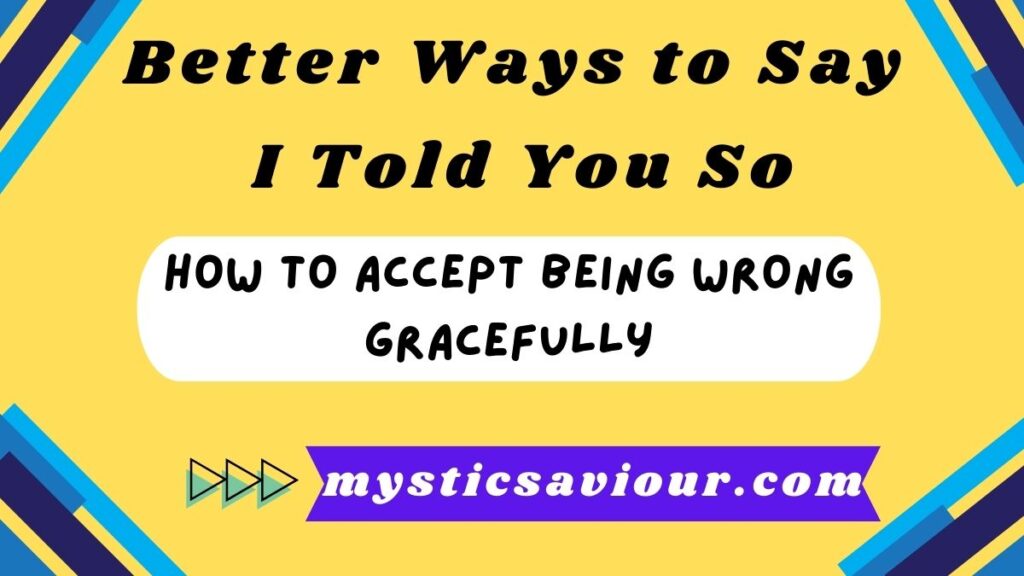
Part of creating a healthy communication environment is modeling how to handle being on the other side—when someone else’s foresight proves more accurate than yours. Consider these approaches:
- Openly acknowledge they were right: “You called it correctly on this one”
- Express appreciation: “Thanks for trying to warn me”
- Show what you learned: “Next time I’ll pay closer attention to those signs”
- Focus on growth: “I understand now why you had those concerns”
By demonstrating this kind of accountability, you create space for others to do the same when roles are reversed.
The Psychology Behind “I Told You So” Conversations
Understanding the psychological dynamics at play helps navigate these interactions more skillfully:
| Psychological Factor | How It Manifests | Better Response |
|---|---|---|
| Loss of autonomy | Defensiveness when reminded of ignored advice | Focus on shared goals instead of past decisions |
| Ego protection | Dismissing the validity of the warning | Acknowledge the difficulty of the decision they faced |
| Status anxiety | Perceiving “I told you so” as a status challenge | Emphasize your mutual concern for good outcomes |
| Confirmation bias | Selectively remembering only accurate predictions | Stay humble about your predictive abilities |
Cultural Differences in Handling “I Told You So” Moments
How these situations are navigated varies significantly across cultures:
- High-context cultures often use indirect communication and might find explicit “I told you so” statements particularly offensive
- Collectivist societies typically prioritize group harmony over individual correctness
- Status-conscious cultures may have different expectations based on hierarchical relationships
- Direct communication cultures might more readily accept straightforward acknowledgment of correct predictions
Being aware of these differences is especially important in diverse workplaces or international relationships.
Practical Examples in Different Relationships
With Children
Instead of: “I told you that if you didn’t study, you’d fail the test.” Try: “Now that we know where you stand with this subject, how can we approach studying differently next time?”
With Partners
Instead of: “I told you we should have left earlier to avoid traffic.” Try: “Traffic is always challenging on Fridays. Next time, we might want to adjust our departure time.”
With Colleagues
Instead of: “I told you that client would be difficult about deadlines.” Try: “Since we now understand this client’s approach to timelines, let’s build in appropriate buffers for the next phase.”
With Friends
Instead of: “I told you that restaurant wouldn’t be worth the hype.” Try: “Places with that much media attention often struggle to live up to expectations. What kind of food are you in the mood for next time?”
Conclusion
Using the 14 Better Ways to Say “I Told You So” Without Damaging Relationships helps you speak with care and respect. These phrases let you show your point without hurting someone’s feelings. They help you stay kind, even when you were right. Being thoughtful with your words can make hard moments easier for everyone.
When you use the 14 Better Ways to Say “I Told You So” Without Damaging Relationships, you build trust instead of creating conflict. These smart and gentle phrases keep your relationships strong. You can share your insight while still being kind. Choose your words wisely, and you’ll be able to speak honestly without sounding rude or proud.
FAQs
1. Why should I avoid saying “I told you so”?
Because it often sounds smug or dismissive, which can hurt feelings and strain relationships.
2. What are some better alternatives to “I told you so”?
Phrases like “You should have listened,” “I warned you,” or “I saw this coming” convey the message more gently.
3. Can I use these alternatives in professional settings?
Yes, expressions such as “As I mentioned earlier” or “I had anticipated this outcome” are appropriate in workplaces.
4. How can I express foresight without sounding arrogant?
Use empathetic language, focus on shared learning, and avoid blaming to maintain a respectful tone.
5. Are there humorous ways to say “I told you so”?
Yes, light-hearted phrases like “Called it!” or “My crystal ball was right!” can add humor without offense.

Eddie Smith, the admin of Mystic Saviour, is a language enthusiast dedicated to exploring the art of words. Passionate about Word Mechanics, Name Narratives, and Linguistic Twists, he helps writers, marketers, and creatives unlock the full potential of language. Through Mystic Saviour, Eddie brings fresh, imaginative alternatives to everyday expressions, making communication more engaging and impactful.
